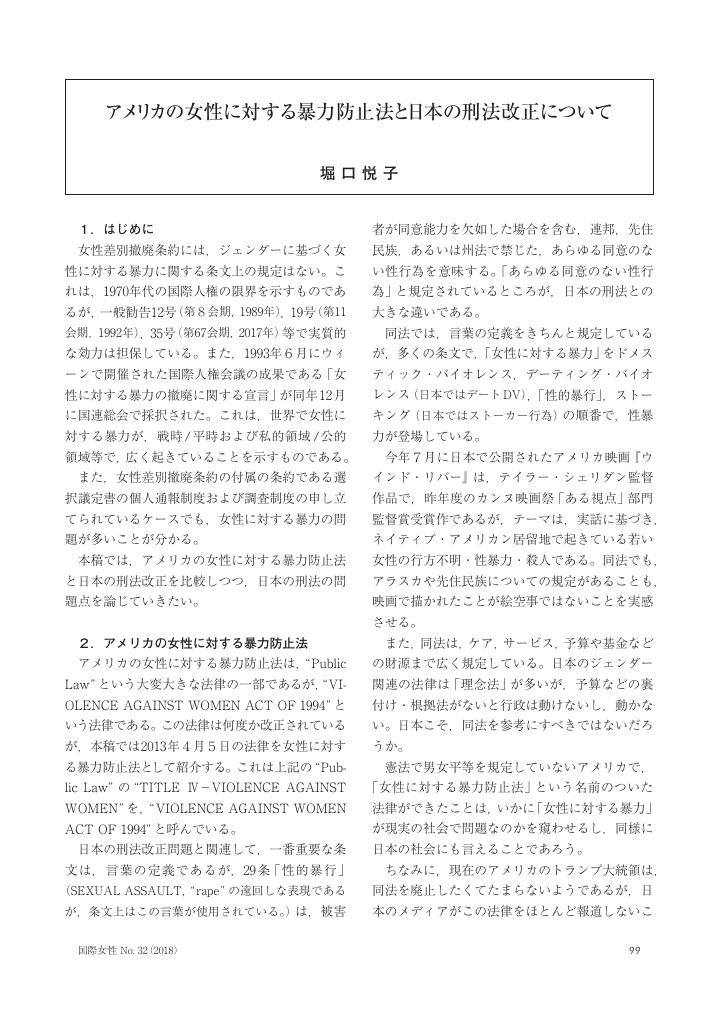4 0 0 0 OA 特集2: 条約とリプロダクティブ・ライツ
- 著者
- 堀口 悦子
- 出版者
- 国際女性の地位協会
- 雑誌
- 国際女性 (ISSN:0916393X)
- 巻号頁・発行日
- vol.11, no.11, pp.166-169, 1997-12-20 (Released:2010-09-09)
- 参考文献数
- 5
1 0 0 0 OA アメリカの女性に対する暴力防止法と日本の刑法改正について
- 著者
- 堀口 悦子
- 出版者
- 国際女性の地位協会
- 雑誌
- 国際女性 (ISSN:0916393X)
- 巻号頁・発行日
- vol.32, no.1, pp.99-100, 2018 (Released:2021-02-01)
1 0 0 0 OA 「中国女性権益保障法」について
- 著者
- 堀口 悦子
- 出版者
- 国際女性の地位協会
- 雑誌
- 国際女性 (ISSN:0916393X)
- 巻号頁・発行日
- vol.7, no.7, pp.139-148, 1993-12-06 (Released:2010-09-09)
1 0 0 0 OA セクシュアル・ハラスメントについて
- 著者
- 堀口 悦子
- 出版者
- 日本法哲学会
- 雑誌
- 法哲学年報 (ISSN:03872890)
- 巻号頁・発行日
- vol.2003, pp.32-42,235, 2004-10-20 (Released:2008-11-17)
- 参考文献数
- 9
Sexual harassment has three types-Quid Pro Quo, hostile condition of work, and gender discrimination types. Sexual harassment is defined as unwelcome sexual behavior toward partner or people. Sexual harassment is abuse of human rights, and is sexual and gender discrimination. Harm caused by sexual harassment is various from use of words to rape. Places where sexual harassment can happen are also various. First, office. Sexual harassment is recognized as happening at office. At Japanese offices, “gray zone” is a special problem. This gray zone is connected with the employment custom in Japanese companies. This Japanese employment custom is that Japanese companies do not regard working women as equal partners. For example, male bosses and co-workers call a working woman “obasan”, which means middle-aged woman, or “ojousan”, which means miss or young lady. But working women have their own names. Working women must do odd jobs for example, “ochakumi” or making copies. Second, university or college. Sexual harassment at universities and colleges is called “campus sexual harassment” in Japan. Probably, the campus sexual harassment is connected with academic harassment in Japan. Academic harassment means harassment by professors. A professor criticizes a student for her or his academic record. Third, school elementary school, junior high school, and high school. Sexual harassment at schools is called school sexual harassment in Japan. It is no exaggeration to say that school sexual harassment is a big issue in Japan. This issue features even on such magazines as are mostly read by men. Fourth, sports. Sportswomen are threatened with sexual harassment by their coaches. Fifth, hospital or medical institutions. In Japan, “power harassment” by doctors becomes a big issue. And sexual harassment by doctors becomes an issue, too. Sixth, area-neighborhood. Sexual harassment is caused by neighbors. Seventh, the power of the State jail or prison. In Japan, female prisoners had been raped by keepers in prison for a long time ago. Another problem is the treatment of women in death cells.
1 0 0 0 セクシュアル・ハラスメントについて
- 著者
- 堀口 悦子
- 出版者
- THE JAPAN ASSOCIATION OF LEGAL PHILOSOPHY
- 雑誌
- 法哲学年報 (ISSN:03872890)
- 巻号頁・発行日
- vol.2003, pp.32-42,235, 2004
Sexual harassment has three types-Quid Pro Quo, hostile condition of work, and gender discrimination types.<br> Sexual harassment is defined as unwelcome sexual behavior toward partner or people.<br> Sexual harassment is abuse of human rights, and is sexual and gender discrimination. <br> Harm caused by sexual harassment is various from use of words to rape.<br> Places where sexual harassment can happen are also various.<br> First, office. Sexual harassment is recognized as happening at office. At Japanese offices, "gray zone" is a special problem. This gray zone is connected with the employment custom in Japanese companies.<br> This Japanese employment custom is that Japanese companies do not regard working women as equal partners. For example, male bosses and co-workers call a working woman "obasan", which means middle-aged woman, or "ojousan", which means miss or young lady. But working women have their own names. Working women must do odd jobs for example, "ochakumi" or making copies.<br> Second, university or college. Sexual harassment at universities and colleges is called "campus sexual harassment" in Japan.<br> Probably, the campus sexual harassment is connected with academic harassment in Japan. Academic harassment means harassment by professors. A professor criticizes a student for her or his academic record.<br> Third, school elementary school, junior high school, and high school. Sexual harassment at schools is called school sexual harassment in Japan. It is no exaggeration to say that school sexual harassment is a big issue in Japan. This issue features even on such magazines as are mostly read by men.<br> Fourth, sports. Sportswomen are threatened with sexual harassment by their coaches.<br> Fifth, hospital or medical institutions. In Japan, "power harassment" by doctors becomes a big issue. And sexual harassment by doctors becomes an issue, too.<br> Sixth, area-neighborhood. Sexual harassment is caused by neighbors.<br> Seventh, the power of the State jail or prison. In Japan, female prisoners had been raped by keepers in prison for a long time ago. Another problem is the treatment of women in death cells.


